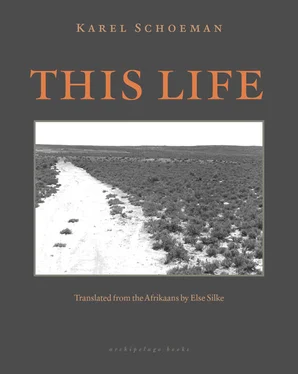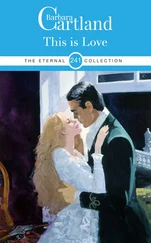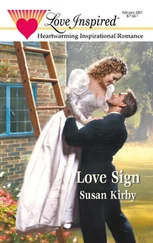Karel Schoeman - This Life
Здесь есть возможность читать онлайн «Karel Schoeman - This Life» весь текст электронной книги совершенно бесплатно (целиком полную версию без сокращений). В некоторых случаях можно слушать аудио, скачать через торрент в формате fb2 и присутствует краткое содержание. Год выпуска: 2015, ISBN: 2015, Издательство: Archipelago, Жанр: Современная проза, на английском языке. Описание произведения, (предисловие) а так же отзывы посетителей доступны на портале библиотеки ЛибКат.
- Название:This Life
- Автор:
- Издательство:Archipelago
- Жанр:
- Год:2015
- ISBN:978-0-914671-16-9
- Рейтинг книги:5 / 5. Голосов: 1
-
Избранное:Добавить в избранное
- Отзывы:
-
Ваша оценка:
- 100
- 1
- 2
- 3
- 4
- 5
This Life: краткое содержание, описание и аннотация
Предлагаем к чтению аннотацию, описание, краткое содержание или предисловие (зависит от того, что написал сам автор книги «This Life»). Если вы не нашли необходимую информацию о книге — напишите в комментариях, мы постараемся отыскать её.
considers both the past and future of the Afrikaner people through four generations of one family. In an elegiac narrator's tone, there is also a sense of compulsion in the narrator's attempts to understand the past and achieve reconciliation in the present. This Life is a powerful story partly of suffering and partly of reflection.
This Life — читать онлайн бесплатно полную книгу (весь текст) целиком
Ниже представлен текст книги, разбитый по страницам. Система сохранения места последней прочитанной страницы, позволяет с удобством читать онлайн бесплатно книгу «This Life», без необходимости каждый раз заново искать на чём Вы остановились. Поставьте закладку, и сможете в любой момент перейти на страницу, на которой закончили чтение.
Интервал:
Закладка:
What did people think of her when they spoke to her outside the church or when they called on her in the new house to satisfy their curiosity? I do not believe she had any true lady friends, not to mention confidantes, and neither did anyone who knew her love or respect her, and she knew this without actually caring in the least, for she desired neither affection nor respect. What did they say among each other as they watched her walk away, followed by Maans and me? She did not care about that either. Father’s status in the congregation and his increasing wealth were important to her, the front seat in church, the new house, the coffee cups, the visiting ministers who stayed the night and the unspoken envy and spite of the other women — I had probably always realised this as I lived beside her, but only now can I find the words to express it, an old woman alone in the dark with no one to listen.
It was during this time that Maans was sent away to school, and I believe that this was Mother’s wish as well, for the desire for every child to be educated was as much a part of the plan she followed blindly yet relentlessly as the new house or the coffee cups. Most young people in our parts were taught at home by school-masters hired by their parents, like my brothers with Meester, or they somehow picked up just enough reading and writing to be confirmed, but in those days no one had a private governess like Miss Le Roux, neither was anyone sent away to school in the Boland, and Maans was the first. Where did Mother get this idea and why was it so important to her? Was it that her instinctive wisdom and insight told her that money and education granted power and commanded respect? Moreover, Maans was her favourite, just as his father once had been, and with an indulgence never evident before, she even showed him some affection at times. Thus Maans was sent to school in Worcester with a small roll of gold coins wrapped in paper, and he was instructed to have a suit made there and to have himself photographed in town and send us the portrait, which Mother kept in her Bible. Maans strongly resembled his father, a big, dark, slow boy, but without his father’s fierce temper, a good, willing child who never gave any trouble or caused any problems: he was excited about leaving home, but at school he did not fare very well. I had to read his infrequent notes with their mistakes and ink blots to Father and Mother, and then Mother took them from me and put them away in her bedroom. Thus the three of us were alone, Father and Mother and I, with old Dulsie in the kitchen, but by this time she had become so old and confused that she could hardly be reckoned any more. Father walked with great difficulty, and the responsibility of the farm fell mostly to Coenraad.
When Maans left it made no real difference to me, for I had lost him when he began to grow up, and I had learned long ago that nothing endured and no belonging could be considered permanent. All my worldly possessions I had obtained through Father and Mother’s mercy and I used them without ever regarding them as my own: clothes to wear, a brush and comb, a sewing kit, a Bible and a hymn book. The only possessions that were truly mine remained a secret that no one else knew of: the little cross Meester had left me and the ring to remind me of Sofie, wrapped in a remnant of cloth and a piece of sheepskin, secreted among the stones of the wall. I never went there to look at them — why would I, for what would I do with them? — yet I was always aware that they were there, an undisclosed and undisclosable secret while Mother and I were curing meat in the kitchen or paring quinces for bottling, while I sat beside Father’s chair with the pillowcase I had to hem, while I served coffee to the visitors, absent-mindedly enduring their questions and their curiosity.
The tiny parcel among the stones in the wall of which no one knew, the memories that I shared with no one, the brightness of the water at Bastersfontein and the thatch and the beams collapsed over the ruins, Sofie in her glistening black frock among the dancers, Pieter with his pale body on the haystack, laughing in the sunshine, the moonlight across the floor and the mist rolling along the kloof, and the stone dislodged by my foot, rolling away, reverberating from one rocky ledge to the next and from one cliff to the next, lost in the vast, invisible depths of the abyss before me. Sometimes I woke at night gripped by an unexpected fear, and in the dark of the sleeping house I lay awake as I do now, surprised by that fear which I could neither explain nor understand. In this bed, in this room I lay in the same darkness, thirty, forty years ago and more; but now there is nothing left to fear, all that remains for me is to remember, and slowly begin to understand.
It was during this time that Pieter came back to us.
One morning, while I was busy in the kitchen, we heard the sound of a rider approaching, and an unknown coloured man announced that he had brought a letter and stubbornly insisted on handing it to Father personally, refusing to entrust it to anyone else. At last I took him into the voorhuis where Father was sitting and he delivered his letter and was so insistent that it was for Father’s eyes only, that it appeared to be part of the instructions with which he had been dispatched. I usually read Father’s letters to him, but this time he did not ask me; and so I continued with my work, and after a while Mother told us to make the man something to eat and closed the door to the voorhuis behind her.
I do not wish to remember any more.
When will the first greyness of dawn become visible behind the wooden shutters; when will the first cock crow in the dark so that I will know that this night is over, that this night, too, has ended? How often I lay awake in the dark like this as a child, in this very room, in this bed, fearing things I did not understand, and again now as an old woman, with the memories taking hold of my mind while I am powerless to defend myself against them, against everything I am forced to remember and would rather forget. I do not wish to remember.
The table where I stand with the knife in my hand, the maid kneeling in the kitchen, blowing on the smouldering fire, and old Dulsie in her usual corner at the hearth — it is enough, it is too much already. We listen to the man leading away his horse to be unsaddled and fed, to the clink of the harness and the clip-clop of the horse’s hoofs, while I prepare his food and pour his coffee. It is too much already, like a shadow passing across the yard, a fleece cloud in front of the sun, like darkness moving over my hands as I am working, over the worn tabletop. It is too far already; too late already.
He sat down at the table to eat, and in a lucid moment old Dulsie realised that he was a stranger and tried to question him, but he was a surly man who did not want to talk. From beyond Hopetown he had come, he said, and his master had sent him with a letter, but he could not be induced to say more, and he refused to divulge even his master’s name. I scarcely listened to their conversation, for Father’s affairs did not concern me and what my parents were discussing behind closed doors in the voorhuis was no business of mine, unless they needed me to read the letter or to compose an answer. This time I was not called in, however, and some time later Mother told us to pack some provisions for Father and gave orders for the cart to be inspanned; that same morning he left with the strange coloured man, without us learning anything more about the visitor or the purpose of his visit; Father who never left the farm any more except to attend Nagmaal in town and who hardly even left the house to walk slowly across the yard to the kraal, leaning on his cane.
For days Dulsie muttered crossly about these events about which she remained in the dark but, as I have said, it was no concern of mine. To push the kettle over the fire for the water to boil, to turn the bread out of the pans and to feel whether the iron was hot enough, those were my duties in life, and they measured out my entire existence. Only sometimes would I look up, cloth, iron, or pan in hand, and through a window or an open door I would notice the wide world outside the walls of the house, or I would see from the yard the horizon beyond the last farm buildings and the glittering of the dams, and then I might forget for a moment what I had been doing; but only for a moment. I was a good daughter, a model daughter, the old ladies sometimes remarked when they called on Mother, a blessing in the house, especially now, with Father needing more and more help, and they glanced at me appraisingly and looked away and spoke of other things, for to them it was only too clear that there was little chance that I would ever marry. What did Mother reply? I do not know; if I ever heard her answer, I must have chosen to forget it. I turned away from the horizon, I walked back to the house with the eggs I had gathered or the washing that had been put out to bleach and, if for a moment my eyes were blinded by the brightness of the sun, it did not matter at all, for I knew my way blindly from one room to the next, where my duties took me. Earlier, when Maans was a small boy, I often took him for walks in the veld, but there was no longer any reason for me to wander outside. The flowers along the ridges in spring, the wind gusting along the rim of the mountains and the tracks of the buck in the mud beside the fountain — I turned away and went inside, I crossed the worn threshhold of the house where duty held me captive, while in the sudden twilight my eyes still retained for a moment those distant images. I was a good daughter, a blessing to Father and Mother in the house.
Читать дальшеИнтервал:
Закладка:
Похожие книги на «This Life»
Представляем Вашему вниманию похожие книги на «This Life» списком для выбора. Мы отобрали схожую по названию и смыслу литературу в надежде предоставить читателям больше вариантов отыскать новые, интересные, ещё непрочитанные произведения.
Обсуждение, отзывы о книге «This Life» и просто собственные мнения читателей. Оставьте ваши комментарии, напишите, что Вы думаете о произведении, его смысле или главных героях. Укажите что конкретно понравилось, а что нет, и почему Вы так считаете.












